The Adventures and Transformations of Dmitry Bystroletov
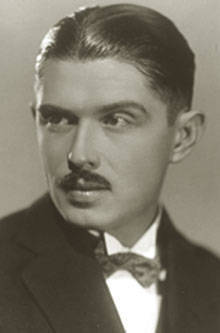 Amazing story outstanding Soviet intelligence intelligence
Amazing story outstanding Soviet intelligence intelligenceThe names of the “great illegal immigrants” of the 30s are inscribed in the Soviet intelligence service in a special font, and among them the name of Dmitry Bystroletov shines with cheerful shine. He contributed a lot to this. A sick and sardonic man, he found himself in oblivion in his declining years and took up his pen. His pen was light, even frivolous, but he could not find the demand for his lively notes. He went so far as to write an interview with himself.
I hurriedly pulled out a pen and notebook.
- Please tell me what you could tell our readers? For example, how to become a scout, how to live in a foreign underground. And, of course, I would like to hear a few examples of your own work.
Dmitry Alexandrovich is thinking.
- I was warned about your arrival. Everything is agreed. But I can only speak under one indispensable condition. German and Italian fascists were destroyed during the last war. But imperialism, as an international system, is alive, and its fosterlings again wage a fierce secret and obvious struggle against our Motherland. Therefore, in my story I must be careful - I will tell you about the essence of several operations, but without naming either names or dates. So it will be calmer ...
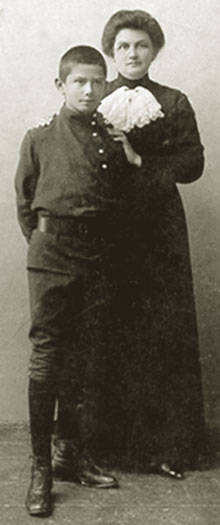 There was nothing of the “fighter of the invisible front” - neither the communist ideology, nor the ponderous sense of duty. Young, light, courtly, exquisitely dressed and charmingly handsome, he resembles the character of the Viennese operetta. He could be a spy for any European country. But fate determined him to work on the NKVD.
There was nothing of the “fighter of the invisible front” - neither the communist ideology, nor the ponderous sense of duty. Young, light, courtly, exquisitely dressed and charmingly handsome, he resembles the character of the Viennese operetta. He could be a spy for any European country. But fate determined him to work on the NKVD.Being confused by obscurity and consciousness of a life lived in vain, he once went to order a suit in the atelier of the Ministry of Defense, to which he was attached, although he never served in the Red Army and did not have a military rank. After talking with the talkative tailor, he learned that the tailor’s son-in-law was writing humorous tales and feuilletons in the newspapers. Bystroletov gave his phone and asked his son-in-law to call on occasion.
The comedian of this name is Emil Dreitzer. Now he is a professor of Russian literature at New York Hunter College. In the USA, his book about Bystroletov, the name of which - Stalin's Romeo Spy, was just published. We jointly translated it as "Stalin's spy-lover" by analogy with the classic theatrical role "hero-lover". We met at the presentation of the book at the Library of Congress, and then we talked for a long time on the phone.
The first and last meeting of Emil with Bystroletov took place on September 11 1973, in a small apartment on Vernadsky Avenue.
- It was a somewhat strange meeting for me. I published as a freelancer in the central press, but I worked completely in a different genre in which Bystroletov might be interested. When my father-in-law told me that one of his customers wanted to meet me, I was surprised, but not very: quite often acquaintances offered some stories from his life to feuilletonists. When I came to him, he said that he wanted to try with my help to write a novel about his life. And he began to tell. I was amazed - I never thought that I could write something other than humor. And by that time he was a much more experienced writer than me: he had already written two novels, screenplays. I think that at that moment he simply despaired, lost faith in the fact that some day the truth about his life would see the light.
I did not know what to do with this material. I came home, wrote down his story, and since the time was alarming — it was the year when Solzhenitsyn was sent — I wrote down his name, just in case, with a pencil, and everything else with ink. It was clear that it was impossible to publish. I did not fully understand why he chose me. Then, when I met with his relatives, they said that at that time he had met with several other journalists. That is, he, apparently, was looking for a way to somehow capture his life. I think he was, in essence, a very naive person. He did not understand, as any practicing journalist of that time understood, that he could and could not write, he did not have a sense of self-censorship. For example, I read his script written in 1964-65, and I was amazed: didn’t he realize that this could not be performed in the Soviet cinema or on the Soviet scene?
- As Bulgakov Master: “Who has inspired you to write a novel on such a strange topic?”
- Exactly! He really did not understand, just like a child, he sent the manuscript to the KGB, and from there it was returned to him naturally.
Emil Dreitzer has saved his notebook. Many years later, already over the ocean, he realized that fate brought him to an amazing personality. And he began to collect materials about Bystroletov.
Appearance
Bystroletov's exploration path was thorny and tortuous. Authors of popular essays about him usually take for granted his own autobiographical notes. Even in the official biography published on the SVR website, it is said that he was the illegitimate son of Count Alexander Nikolayevich Tolstoy, an official of the Ministry of State Property. But evidence of this version does not exist. Dmitry Bystroletov was born in 1901, near Sevastopol, in the Crimean estate of Sergei Apollonovich Skirmunt, a well-known publisher and bookseller at the beginning of the last century. His mother, Claudia Dmitrievna, was one of the first Russian feminists and suffragists, a member of the Society for the Preservation of Women's Health, wore trousers and decided to have a child out of wedlock as a challenge to the then propriety. Here is the version of Emil Dreitzer:
- His mother simply persuaded one of the vacationers in the Crimea to become a father, because she was a suffragist and wanted to prove that she didn’t care about the so-called decent society.
So Dmitry Bystroletov was born, never knowing his biological father. The advanced views of the mother brought him a lot of suffering. He rarely saw his mother. Three years old, he was sent to Petersburg, to the family of a widow who had shot herself because of a gambling debt of a guard officer, who had two daughters. Mitya did not need anything, but he was very sad. “The years of stay in St. Petersburg,” he wrote later, “now draw me like a pink, sweet puffer that gets annoyingly biting my teeth, and the meetings with the Wasp are remembered as the whistle of the whip.” Wasp - mother's nickname.
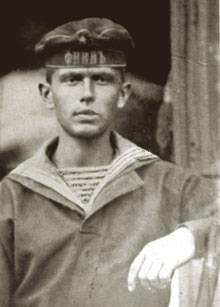 In 1917, Bystroletov graduated from the Sevastopol Naval Cadet Corps and fell into World War II, was a participant in the operations of the Black Sea fleet against Turkey. In 1918, after graduating from the Naval College and Gymnasium in Anapa, he entered as a volunteer, that is, a volunteer on preferential terms, into the Naval Forces of the Volunteer Army. In 1919 he deserted, fled to Turkey, worked as a sailor, learned what physical labor, hunger and cold are.
In 1917, Bystroletov graduated from the Sevastopol Naval Cadet Corps and fell into World War II, was a participant in the operations of the Black Sea fleet against Turkey. In 1918, after graduating from the Naval College and Gymnasium in Anapa, he entered as a volunteer, that is, a volunteer on preferential terms, into the Naval Forces of the Volunteer Army. In 1919 he deserted, fled to Turkey, worked as a sailor, learned what physical labor, hunger and cold are. From the books Bystroletova "The Feast of the Immortals." I saw a German submarine and a Turkish destroyer, heard the whistle of shells aimed "at me". I got used to sleepless nights, to dragging bags on my back, to motherhood and drunkenness, to the roar of the waves, to prostitutes. I was surprised at how absurd the intellectual existence and all these Fat and Dostoevskys appear, if you look at them from the standpoint of working life.
Finally, Dmitry Bystroletov ended up in Prague, one of the centers of Russian emigration, without means of livelihood and with dim prospects. There he was recruited by a staff member of the OGPU Foreign Department. Then, in the past, many irreconcilable enemies of the Soviet government went to cooperate with the Soviet "organs" - from lack of money, from despair, from patriotism (recruiters played on this string especially skillfully).
However, Bystroletov himself in a conversation with Dreitser claimed that they had recruited him back in Russia, and in Prague they “re-invented”:
- He told me that he was recruited during the Civil War, when he and his friend overtook the Greek ship to Evpatoria, where they were already red and Cheka. The representative of the Cheka addressed him and said that now, if you want to help your homeland, then go with the flow of refugees to the West, we will eventually make you feel. And he then, I remember, said: “Well, what I understood there, what I knew, I was a young man ... Who can say no, when they offer to be useful to their homeland.” And then in Czechoslovakia, he became secretary of the local "Union of Students - Citizens of the USSR." He participated in the activities of the Union very actively. In the Prague archive, I saw the newspaper 1924-25 of the year, where his name is mentioned more than once. They opposed themselves to white emigres. For example, he and his friends, when Lenin died, set up a guard of honor. And just then the Soviet trade mission in Prague noticed him and sheltered him, gave him a job, because they wanted to send him out of the country.
Emil Dreitzer is convinced that, in Bystroletov's agreement to work for Soviet intelligence, his child’s psychological trauma, a complex of abandonment and uselessness, which he carried through his entire childhood, played a significant role.
- What is Bystroletov as a person? What were his beliefs? Why did he go on reconnaissance?
- The roots of everything that happened to him were personal, deeply personal. Due to the circumstances of his birth, this strange relationship with his mother, he was a young person with a disadvantaged personality. He felt his inferiority. When he found himself outside of Russia, he felt an inner need to be with his mother and motherland, without this he did not feel like a normal person. That's why he was easy to recruit. In addition, he was completely destitute. He writes bluntly that when the Soviet trade mission finally sheltered him, for the first time in many years he was full of food. He was impoverished and ready to do whatever he wanted, because he was promised that he would be returned to the Soviet Union, but it must be earned, for this we need to do something.
- That is, on the one hand, it is restlessness, and on the other - self-affirmation and, apparently, romance of espionage.
- Yes of course. He believed in the ideals of the revolution, because he really dragged out an eerie, beggarly existence ... And he, of course, did not know the real face of the revolution.
Bystroletov received a modest post of some clerk and at first did not do anything significant. But in the spring of 1927, the Soviet network of agents in Europe suffered a series of crushing failures. In the leadership of the Foreign Department of the OGPU was the first cleaning. The center of gravity, it was decided to transfer to illegal intelligence. It was because of this directive that Dmitry Bystroletov was transferred to an illegal position.
- He wanted to return to 1930 year. He already understood everything, he was tired of all this. And then there was a colossal failure of the Soviet spy network, not only in Europe, but, if I am not mistaken, both in China and in Japan. It was then that a new appeal was urgently needed, and he was offered to stay for a couple of years, but already as an illegal. In this lesson, there was a large element of risk, and it is not for nothing that he quotes Pushkin’s “Feast during the Plague”: “Everything, everything that threatens with death, is fraught with inexplicable delights for a mortal heart ...” He was attracted by this feeling. But he did not think that this would be delayed for many years, that when he wants to return, he will be told: the country needs to do this and this, fifth-tenth ...
Seduction
By many of its qualities, Bystroletov was ideally suited to work in illegal intelligence. He had innate artistry, he spoke freely in several languages (he himself claimed to be at 20), and managed to get a good and versatile education. Finally, he had another quality about which the chaste authors of his official biographies are embarrassed to say. Bystroletov was charmingly handsome and knew how to use his masculine charm. Emil Dreitser tells:
- At first, he was doing what intelligence is usually doing: he read newspapers in search of information that could be useful. And then he was attracted for the first time ... He told me directly when we met: “I,” he says, “was young, handsome and knew how to deal with women.”
In the arsenal of intelligence is weapon It is not the last place. Once I told in the Top Secret pages about how the common-law wife of the head of the Soviet intelligence network in the USA Yakov Golos Elizabeth Bentley after her husband's death fell into depression, and the resident asked the Center to send her a new husband, but the Center hesitated and Bentley issued the authorities the whole network. Another example is the daughter of the American ambassador in Berlin, Martha Dodd, recruited by Soviet intelligence officer Boris Vinogradov, with whom she passionately fell in love. We can also recall the Don Juan adventures of the Englishman John Simonds, who at the beginning of the 70-s himself offered his services to the KGB as a lover-spy. In his autobiographical book, Simonds recalls with delight the lessons of professional skill he received from two charming Russian female instructors. Last year, one of the major film companies acquired the rights to film the book of Simonds, but it wasn’t decided yet who would play the main role - Daniel Craig or Jude Law.
In his declining years, Bystroletov remembered his men's victories not without pride. He won the first of them in Prague. In his notes he calls the lady whom he met on the instructions of the resident, Countess Fiorella Imperiali.
- Only for an hour! For one hour!
And then Iolanthe received from the resident a task on the bed part ...
According to Emil Dreitzer, the lush title of his passion Bystroletov invented - partly for reasons of secrecy. In fact, it was a modest secretary of the French Embassy. In the book by Christopher Andrew and Vasily Mitrokhin, “The Sword and Shield”, the real name of this woman is named Eliana Okutyurer. She was then 29 years old.
As for another passionate romance - with the mistress of the Romanian general, today no one will undertake to assert for certain that he was in fact, he is very described as being described, directly to Paul de Cock of some sort.
Emile Dreitzer believes that in fact, bystroytova had intimate connections with espionage goals, no more than two or three.
- I think he used it with a Frenchwoman and was also the wife of the English agent Oldham, who himself, by the way, came to the Soviet embassy. And then there was a different situation: she herself took the initiative because her husband was an alcoholic, and she was in utter despair.
The operation of the development of the cipher clerk of the British Foreign Ministry, Captain Ernest Oldham, was Bystroletov's biggest professional success. In August 1929, Oldham came to the Soviet Embassy in Paris. In a conversation with OGPU resident Vladimir Voinovich, he did not call himself by a real name and offered to sell a British diplomatic code for 50 thousand dollars. Voinovich shot down a price of up to 10 thousand and made an appointment with Oldham in Berlin early next year. At the meeting went Bystroletov. It was then that he began to pretend to be a Hungarian count who had fallen into the Soviet intelligence network, and entered into an intimate relationship with Oldham's wife, Lucy, in order to bind the spouses closer to him.
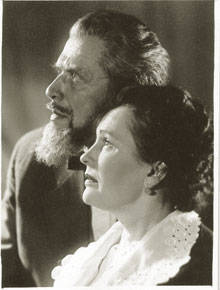 The echo of this story is in the movie 1973 of the Year “A Man in Civilian”, filmed according to the script of Bystroletov, who himself played a cameo role in it. The film told about the adventures of the Soviet intelligence officer Sergei in Nazi Germany three years before the start of the Second World War. The picture differed from other espionage fighters in that there was absolutely no heavy Soviet ideology, nostalgia for Russian birch trees and rhetoric about high debt. Sergey, whose role was played by young Juozas Budraitis, was an elegant handsome man who accomplished his spy feats easily, elegantly and not without humor. The hero of “The Man in Civilian” was akin to James Bond, and the film, like the films of Bond, is a bit of a parody. I remember that I was particularly amused by Sergey’s fake name — the distinguished but ruined Hungarian Count Perenyi de Kiralgaze. It reminded me of the word "kerogaz."
The echo of this story is in the movie 1973 of the Year “A Man in Civilian”, filmed according to the script of Bystroletov, who himself played a cameo role in it. The film told about the adventures of the Soviet intelligence officer Sergei in Nazi Germany three years before the start of the Second World War. The picture differed from other espionage fighters in that there was absolutely no heavy Soviet ideology, nostalgia for Russian birch trees and rhetoric about high debt. Sergey, whose role was played by young Juozas Budraitis, was an elegant handsome man who accomplished his spy feats easily, elegantly and not without humor. The hero of “The Man in Civilian” was akin to James Bond, and the film, like the films of Bond, is a bit of a parody. I remember that I was particularly amused by Sergey’s fake name — the distinguished but ruined Hungarian Count Perenyi de Kiralgaze. It reminded me of the word "kerogaz."Lucy Oldham in this picture turned into the wife of the colonel of the general staff of the Wehrmacht, Baroness Isolde von Ostenfelsen. She played Irina Skobtseva, and the Baron himself - Nikolai Gritsenko. Of course, no alcoholism and bed scenes: the baron is an ideological spy.
Another line of the film - the relationship of the hero with a female Gestapo officer is not without a documentary basis. Emil Dreitzer tells:
- She was not just ugly - she had a burned face, as a child she got into a car accident. And of course, it was impossible to approach her like, say, a French woman, to pretend that you fell in love with her. The Frenchwoman was pretty and young, and this one was near 40, and she was completely disfigured. But he found a psychological key. She was an ardent Nazi, and he tried to ask all the time how to provoke: what is so special about this Mr. Hitler, in Goebbels? I am Hungarian, I lived in America and I do not understand why you have such a big stir in Germany. And he was able to convince her that he is such a naive young man who does not know European politics. So gradually he was able to seduce her and become her lover. This is probably the highest class.
In the film “The Man in Civilian” the role of the SS Sturmführer Doris Sherer plays Lyudmila Khityaeva. Over a glass of wine, she draws the Hungarian playboy into her faith: "You must understand, Count, that the German northern race will soon become the master of the world." “And what do you promise us, Hungarians?” The count is interested. “Joy and honor to work under the guidance of a Nordic man!” Doris responds with ecstasy. The subject of her special pride is an album with a project of an exemplary concentration camp. All this was a revelation in the then Soviet cinema.
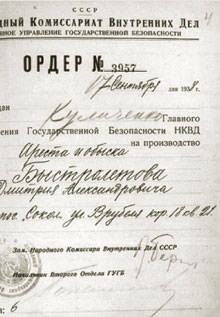 Return
Return- You see, Emil, with Bystroletov I have some special difficulty. He, of course, occupies a separate place among Soviet intelligence officers. And frankly, makes a dual impression. He himself is to blame, his own writings on his espionage adventures are lightweight fiction. But here the human essence escapes, it is not visible behind this pose. And it is not visible, in fact, real cases. Here, for example, in the history of the atomic bomb, everything is clear, we know: a bomb was made. And in the case of Bystroletov - well, I got the ciphers, and then what?
- Everything that you said explains the tragedy of Bystroletov’s life. At the end of his life, he understood what you were saying: everything that he got - diplomatic ciphers, weapon samples and everything else - was not fully used. He realized that he was a pawn in a huge game. He mined, others mined, but Stalin, as we know, forbade analyzing the data: "I myself will analyze and think what it means." The fact of the matter is that his life was almost completely thrown into the garbage can. He understood this and in his last book he writes directly: at night I wake up and think about what the best years of my life were spent on, not only mine, but also my fellow intelligence officers ... It's terrible to grow old and stay at the end of life with a broken trough Here are his words.
I understand perfectly well that in some episodes he, as a person, evokes mixed feelings. Since childhood, he was a man of undermined dignity, so he did many things that didn’t adorn him at all. But he needed it for self-assertion.
However, we ran ahead. Let us return to the time when the Great Terror unfolded in Stalin’s Soviet Union. In September, 1936 was removed from his post as Commissar of Internal Affairs Heinrich Jagoda. He was replaced by Nikolai Yezhov. Began arrests of leaders of the Foreign Department. Employees of the foreign intelligence unit replied to Moscow. Nobody came back. Ignatius Reuss received a call in 1937 in the year, but decided to stay in France and was killed in Switzerland the same year as a result of a special operation by the NKVD. His friend and colleague Walter Krivitsky also stayed in the West. The head of the London illegal residency Theodore Mulley returned and was shot. Received an order to return and Dmitry Bystroletov.
- As far as I understand, he knew Ignatius Reiss, knew Malley, apparently knew Krivitsky ...
- Yes.
“Malley is back, and Reuss and Krivitsky are defectors.” Bystroletov could not help but think on this topic, he knew, of course, what was happening to those who had been recalled to Moscow. He was ready for what would happen to him, hoping to justify himself? Why is he back?
- I think he still did not fully believe ... He was naive in this sense, did not fully understand the reason for the Great Terror. He thought it was a mistake after all. Even when he was arrested, after his arrest. Like many others, by the way.
- In fact, after all, almost all the scouts have returned. Reuss and Krivitsky are a rare exception. They all set off like rabbits into the mouth of a boa ...
- In fact, he could not help but return. Such was his inner self-perception — outside the country in which he was born, he felt himself as nothingness. It was not easy to understand, I consulted with both psychiatrists and psychoanalysts. Unfortunately, this is how it happens in people who are traumatized in childhood. He understood that. He has a chapter in which he describes the psychological deviations of his mother, grandfather, grandmother, and so on. He understood that. He spoke about it directly.
- But didn’t Bystroletov really guess what was going on in his homeland?
- He preferred not to see it.
In the film “A Man in Civilian”, the intelligence officer who returned to Moscow with honor, to the bells of the chimes, fatherly takes the head of intelligence and gives him a new task - in Spain. In fact, sent him to a completely different place. To begin with, he was fired from the NKVD and appointed head of the translation bureau of the All-Union Chamber of Commerce. In September, 1938, bystroletov, was arrested on espionage charges. Even his investigator Soloviev did not understand such submission to fate.
- Wait a minute! - he remembered. “So you really had that kind of money in your hands, Mityuha?” Three million in currency?
- Yes. I had my own firm and my currency account.
- If you have a foreign passport?
- a few. And everyone was authentic!
Solovyov looked at me for a long time. His face showed utter amazement.
“So, on any given day, could you jerk to another country with this money and cool yourself over the coffin of life for your pleasure?”
- Yes of course...
Solovyov froze. His mouth opened. He bent over me.
- And still arrived? - and added in a whisper, gasping for breath: - This way ?!
- Yes, I came back. Although I could well have expected arrest: the foreign press wrote a lot about arrests in the USSR, and we were well informed about everything.
- So, why did you come back ?! Ram! Moron! Cretin! - he shakes his head: - One word - bastard! ..
I looked up:
- I returned to my homeland.
Solovyov shuddered.
- I traded foreign currency for the Soviet bullet ?!
Dmitry Bystroletov could not stand the torture and signed everything that he was required to sign.
From the verdict of the military board of the Supreme Court of the USSR. The preliminary and judicial investigation established that Bystroletov had been a member of an anti-Soviet Socialist-Revolutionary terrorist and sabotage and sabotage organization for a number of years. While living in Czechoslovakia in exile, Bystroletov established contact with foreign intelligence and, on her assignment, entered the work in the Soviet trade mission. Working abroad in a Soviet institution, Bystroletov passed on to foreign intelligence information constituting state secrets. In 1936, bystroletov, arriving in the Soviet Union, got a job at the All-Union Chamber of Commerce, where he created an anti-Soviet Socialist-Revolutionary group. In the USSR, Bystroletov established contact with agents of British intelligence and gave them spy information.
With such a corpus delicti, they could have been sentenced to death, but Bystroletov received 20 years of camps. Why? Emil Dreitser believes that as a result of another change of leadership in the NKVD, - instead of Nikolai Yezhov, Lavrenty Beria became the people's commissar.
“It was precisely because he didn’t immediately sign that he won the time and survived.” Under Beria, after all, statistics show that there were far fewer executions. And he signed, reasoning: “Well, well, it is clear - after the next torture they will kill me. And what will happen next? My name will be forever trashed. But if I stay alive, then I will have a chance someday to achieve a revision. "
The years spent in the camp, he described in the book "The Feast of the Immortals." Its distinctive feature is that the author does not shift the responsibility for what happened to someone else.
Emil Dreitser tells:
- There was an incident in the camp with him, and for a long time I could not understand what had happened until the psychiatrist explained to me. At the logging site, the guard called the prisoner and, when he approached, he simply shot him at close range. Then he rearranged the red flags, denoting the zone, so that it turned out that the prisoner was killed while trying to escape. It was made in front of everyone. In Bystroletov, who was watching the whole scene, suddenly paralyzed the right side of his body, arm and leg. The psychiatrist to whom I told this case explained to me what was the matter. His natural reaction was to hit the convoy. This meant immediate death - he would have been shot on the spot in the same way. He restrained himself with an effort of will - and got paralysis. Then he tried to commit suicide, but he could not tie a loop on the rope with a paralyzed hand.
In the Kolyma wilderness, on the bunks of Bystroletov, he recalled the alpine meadows of Switzerland, the sea breeze of the Cote d'Azur and "squeezed novels."
From the "Pir of the Immortals." “Journey to Bellinzona” or “The Girl and the Stone,” I begin. Then I close my eyes - and, strangely, I suddenly see before me what my life once was. This is not a memory. This is either reality, more real than a dead mouth with jelly at my dirty feet, or a saving dream and rest. Without opening my eyes, so as not to frighten off light vision, I continue:
- In the thirty-fifth year, I often had to travel on business from Paris to Switzerland. Sometimes, in the evening, having finished work, I was going to the station. Taxi barely makes its way into the thick of cars and people. Half-closed eyelids, I wearily watch flashes of multi-colored advertising, listen to the waves of music and the crowd talk through the uniform rustle of the movement of thousands of automobile tires on the wet asphalt. The world city sails beyond the windows of a taxi ... And in the morning I lift the curtain on the window of a sleeping car, lower the glass, stick my head out - God, what a sweetness! Porrentruy ... Swiss border ... It smells of snow and flowers ... The early sun gilds distant mountains and dew drops on roof tiles ... Starched girls on the platform roll trays with big bellied mugs of hot chocolate ...
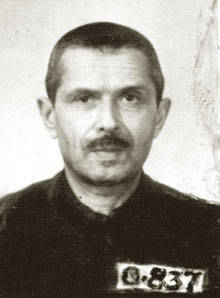 Insight
InsightBystroletov believed in the possibility of justifying for a long time, up to the 1947 year, when he was unexpectedly brought from SibLag to Moscow. At Lubyanka, he was taken to the spacious office of State Security Minister Viktor Abakumov. The minister offered him amnesty and return to intelligence. Bystroletov refused. He demanded full rehabilitation.
Abakumov’s response was a three-year imprisonment in a solitary cell of one of the worst prisons of the NKVD, Sukhanovskaya. And then - return to hard labor. Like many of his comrades in misfortune, even in the Bystroletov camp they did not lose faith in the bright future of socialism.
- You said that for him there was a difference between the regime and the motherland.
- He had the opportunity to run. In the Norilsk camp. And he decided at the last moment, when he saw the construction of a huge combine that was built by prisoners ... it was captured by this magnificent sight, captured by the feeling that now, in my country such a huge combine is being built, that everything that is being done is finally done for the benefit of the motherland, let the prisoners build it. That is, he was a victim of Stalinist propaganda. That's the problem. He was a Stalinist, I think, until the 1947 of the year. At first, he believed, like many, that Stalin did not know what was happening. Now, if they tell him how they grab people for nothing, he will put it all in order. He had a change gradually. And, say, in the 1953 year, by the time the doctors' case was unfolding, he already fully identified Nazism and Stalinism. By 53, he was a perfect anti-Stalinist. But still he believed that socialism should win. And only gradually, in the last book, The Difficult Way to Immortality, he comes to the realization that it’s not even Stalin’s case, that there would have been no Stalin without Lenin. He had already come to this end - to the complete rejection of communism as an idea.
He survived. He was released in 1954, rehabilitated in 56. Huddling with his wife in a squalid communal flat, disabled and completely demoralized, he earned his living by translating medical texts (besides a law degree, he also had a medical degree). Gradually the epiphany came. The political prisoner's experience made him anti-Stalinist, but he believed in socialism for a long time.
In 1960-s, the new KGB chairman, Yuri Andropov, decided to “rehabilitate” Lubyanka. There were books, films, memories of the heroic everyday life of intelligence. Vivid examples were required. Recalled and about Bystroletov. His portrait was hanged in a secret room of military glory in the main building of the KGB. He was offered an apartment in return confiscated and retired. He took the apartment, but refused to retire. Andropov did not know that by that time a former enthusiastic young man, a romantic intelligence officer, had become a staunch anti-communist.
“I read somewhere that in 1974, when the campaign against Solzhenitsyn began, Bystroletov staged or falsified the destruction of his own manuscripts. That is, he has already identified himself as a dissident ...
- Of course. When Solzhenitsyn was expelled, he realized that he, too, could be in danger, and faked the burning of his memoirs. He really considered himself a dissident. This is quite obvious - in the last book, The Difficult Way to Immortality, he comes to a complete denial of what he believed in at the beginning of his life. For this reason, the spy movie script that was graciously allowed to write to him turned out to be completely apolitical.
- Still an amazing evolution.
- That is what pushed me, after all, I spent so many years studying his life. He is one of the few people I knew, who was able to overcome his youthful blind faith in communism. Most of the people of his generation, even the victims, remained in their previous positions: yes, there were mistakes, but the system was correct. Were able to overcome a unit. For this, I ultimately respect Bystroletov. Although he, of course, a complex personality. He himself was ashamed of many of his actions. Nevertheless, he was capable of this internal coup - I think, because he was merciless to himself.
- For this you need to have courage.
- He was, undoubtedly, a courageous man.
Dmitry Bystroletov died 3 on May 1975 of the year. He was buried at the Khovansky cemetery in Moscow. In 1932, he was awarded with a nominal weapon "For the merciless struggle against counter-revolution". He had no other government awards.
Photo from the archive of S.S. MILASHOVA published with kind permission
- Vladimir ABARINOV
- http://www.sovsekretno.ru"rel =" nofollow ">http://www.sovsekretno.ru
Information